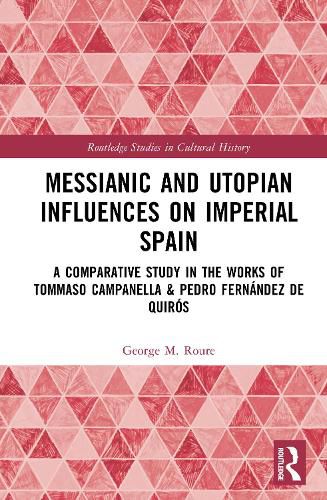Readings Newsletter
Become a Readings Member to make your shopping experience even easier.
Sign in or sign up for free!
You’re not far away from qualifying for FREE standard shipping within Australia
You’ve qualified for FREE standard shipping within Australia
The cart is loading…






Roure draws a novel connection between Tomasso Campanella's utopian ideas for Imperial Spain and Catholicism and Portuguese navigator Pedro Fernandez de Quiros' vision of an idyllic society and a mythical city of New Jerusalem in the antipodes.
The book presents newfound evidence suggesting Spain experimented with Messianism to secure their empire in the late Renaissance. The case is made that the Spanish monarchy contemplated Campanella's Messianic ideas and sent Quiros to initiate them on the imagined Terra Australis Incognita. Campanella and Quiros shared idiosyncratic beliefs that by means of divine providence Spanish power would imminently transform the world, elevate humanity to a higher spiritual plane, dominate politics and religion and prepare for the second coming. The work advances our understanding of previously unknown links between Campanella's religious solutions for idealising temporal government, Quiros's objective of a utopian society in the great south land and Spain's tentative experimentation with Messianism. It also permits the drawing of inferences on the possible rationale behind political messianism in the contemporary world.
A valuable resource for scholars, students, researchers, and professionals interested in European and World History of the late Renaissance as well as those interested in the religious and political imperatives of Imperial Spain during the Habsburg period.
$9.00 standard shipping within Australia
FREE standard shipping within Australia for orders over $100.00
Express & International shipping calculated at checkout
Roure draws a novel connection between Tomasso Campanella's utopian ideas for Imperial Spain and Catholicism and Portuguese navigator Pedro Fernandez de Quiros' vision of an idyllic society and a mythical city of New Jerusalem in the antipodes.
The book presents newfound evidence suggesting Spain experimented with Messianism to secure their empire in the late Renaissance. The case is made that the Spanish monarchy contemplated Campanella's Messianic ideas and sent Quiros to initiate them on the imagined Terra Australis Incognita. Campanella and Quiros shared idiosyncratic beliefs that by means of divine providence Spanish power would imminently transform the world, elevate humanity to a higher spiritual plane, dominate politics and religion and prepare for the second coming. The work advances our understanding of previously unknown links between Campanella's religious solutions for idealising temporal government, Quiros's objective of a utopian society in the great south land and Spain's tentative experimentation with Messianism. It also permits the drawing of inferences on the possible rationale behind political messianism in the contemporary world.
A valuable resource for scholars, students, researchers, and professionals interested in European and World History of the late Renaissance as well as those interested in the religious and political imperatives of Imperial Spain during the Habsburg period.